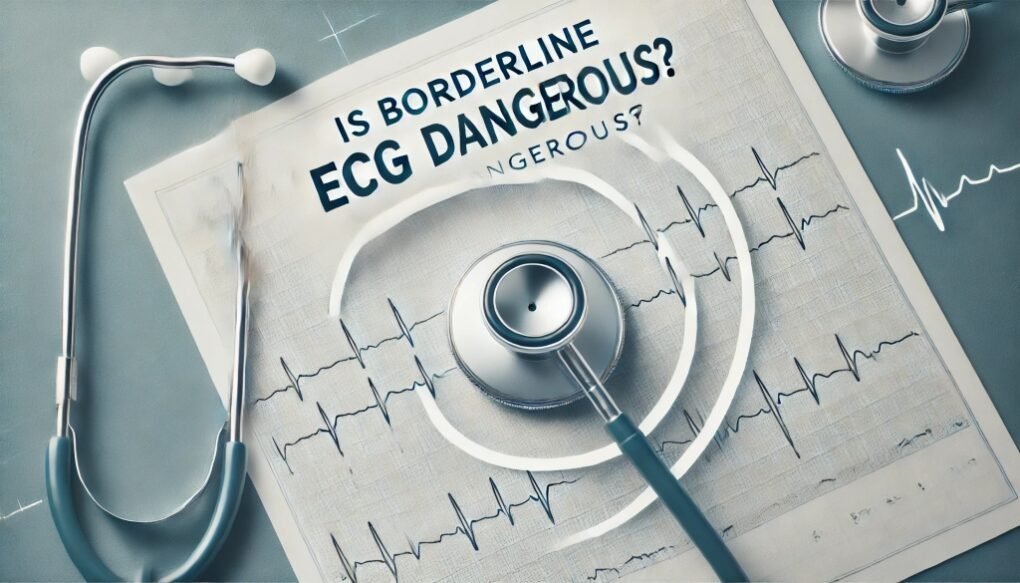A borderline ECG result can raise concerns and leave patients wondering about its meaning. While an electrocardiogram (ECG) is commonly used to assess heart health, the term “borderline” might not always provide clear answers. In this article, we’ll explore what a borderline ECG means, why it happens, and what steps you should take if your results fall into this category. We will also touch on the next steps for diagnosis and how to approach treatment options if necessary.
What is a Borderline ECG?
An electrocardiogram (ECG) is a diagnostic tool that records the electrical activity of the heart over a short period of time. It is used to detect abnormalities such as irregular heartbeats, heart enlargement, or issues with the heart’s electrical pathways. A borderline ECG result indicates that the readings are not entirely normal but not definitively abnormal either.
This result can be ambiguous and might cause some confusion. Typically, it suggests that the findings don’t clearly point toward any major heart issue, but there are slight deviations from normal ranges that require further observation or testing. It’s important to note that a borderline ECG does not confirm heart disease but may necessitate closer monitoring.
Causes of a Borderline ECG
There are several reasons why an ECG may show borderline results. Understanding these can help demystify what might seem like a confusing diagnosis. Some of the common causes include:
- Electrolyte Imbalance
Electrolytes such as potassium, sodium, and calcium play a significant role in maintaining the heart’s electrical stability. Any imbalance in these minerals can cause slight irregularities in ECG readings. For example, low potassium levels (hypokalemia) can lead to abnormalities that may result in a borderline reading. - Age-Related Changes
As we age, the structure and function of the heart undergo natural changes. These changes may sometimes lead to slight irregularities in ECG readings, especially among older adults. While these may not indicate any immediate heart problem, they can still show up as borderline. - Medications
Some medications, particularly those affecting heart rhythm or blood pressure, can alter ECG results. Drugs such as beta-blockers or calcium channel blockers might slow down the heart’s rhythm slightly, leading to results that appear borderline. - Physiological Variations
Individuals have different heart structures and rhythms. For example, athletes often have a lower resting heart rate due to increased cardiac efficiency, which can sometimes produce borderline ECG results without indicating any underlying problem. - Anxiety and Stress
Emotional states like stress or anxiety can cause temporary fluctuations in heart rate and rhythm. These factors might contribute to a borderline ECG, particularly if the person is anxious during the test.
Common Symptoms Associated with it
A borderline ECG itself does not always correlate with symptoms, and many individuals may feel entirely normal despite the finding. However, in some cases, a borderline ECG could be accompanied by certain symptoms such as:
- Chest pain or discomfort
- Palpitations or rapid heartbeats
- Fatigue or shortness of breath
- Dizziness or lightheadedness
If you are experiencing any of these symptoms, it is essential to consult a healthcare provider for further investigation, even if your ECG results are borderline.
What Should Do After Receiving a Borderline ECG?
If you have received a borderline ECG result, it’s natural to feel concerned. However, it’s important not to panic. In most cases, a borderline ECG requires further investigation rather than immediate treatment. Here’s what you should consider:
- Follow-up Tests
A single ECG is only a snapshot of your heart’s activity at that moment. To get a clearer picture, your doctor may order additional tests such as a stress test, Holter monitoring (which records your heart’s activity over 24 to 48 hours), or echocardiography to provide more insight. - Lifestyle Modifications
In many cases, lifestyle changes may be recommended even if there is no immediate cause for concern. Eating a heart-healthy diet, exercising regularly, reducing stress, and quitting smoking can all contribute to better heart health and help prevent future problems. - Medication Review
If you are taking medications that could affect your heart’s rhythm, your doctor may adjust your prescription or monitor you more closely to ensure that the medication isn’t causing adverse effects on your heart. - Continued Monitoring
Borderline ECG results often lead to a period of watchful waiting. Regular check-ups and repeat ECGs may be scheduled to monitor any changes over time. Many cases resolve without further intervention, but continued monitoring ensures that any emerging issues are caught early.
When Should You Be Concerned?
While a borderline ECG is not always indicative of a serious condition, it’s important to be aware of the potential for more concerning diagnoses. If symptoms such as severe chest pain, fainting, or sudden shortness of breath occur, immediate medical attention is required. Such symptoms, especially when paired with a borderline ECG, could suggest more significant cardiovascular issues like arrhythmias or ischemic heart disease.
Role of Stress and Mental Health in ECG Results
Stress can have a notable impact on heart health and may influence ECG results. When under stress, the body releases hormones such as adrenaline that can speed up heart rate and increase blood pressure, leading to borderline or abnormal readings on an ECG. Chronic stress may even contribute to long-term cardiovascular problems if not managed properly.
It is crucial to address mental health as part of overall well-being, particularly in individuals with borderline ECG results. Practices such as meditation, breathing exercises, and mindfulness can help manage stress and, in turn, positively influence heart health.
How Accurate is a Borderline ECG?
ECG machines are highly reliable in detecting irregularities in heart function, but like any medical test, they are not foolproof. Several factors, such as improper lead placement or patient movement during the test, can impact results. Additionally, some borderline readings might simply reflect normal variations in heart function rather than underlying pathology.
However, the ambiguity of a borderline ECG does not mean it should be dismissed. It’s critical to follow up with a healthcare provider for further clarification and testing.
A borderline ECG result can be confusing, but it doesn’t necessarily indicate a serious heart problem. Various factors, including electrolyte imbalances, medication use, or even stress, can contribute to this type of result. The best course of action is to consult with a healthcare professional, undergo further testing, and adopt heart-healthy lifestyle habits to manage the situation effectively. Remember that early intervention is key to preventing potential future complications.











